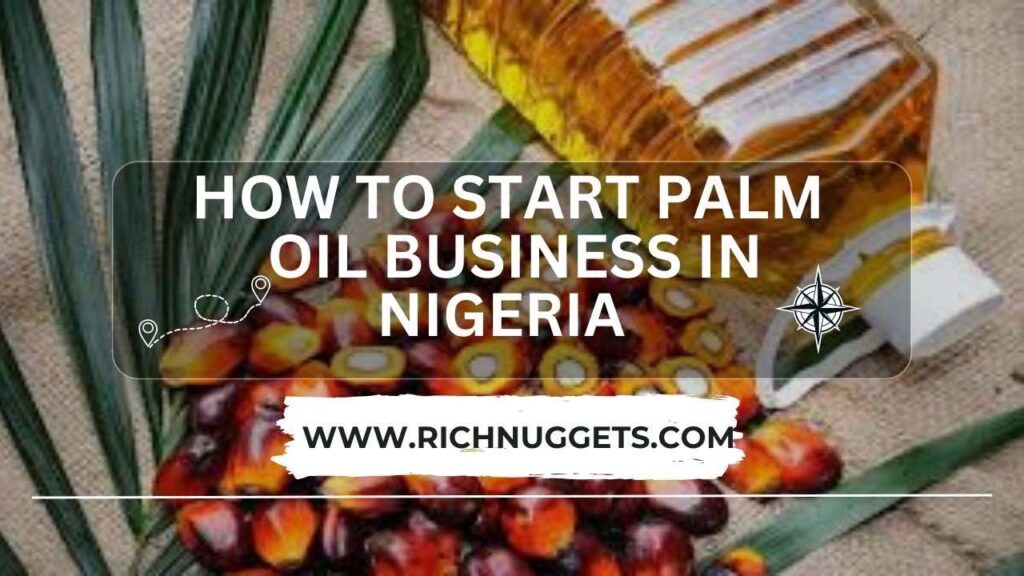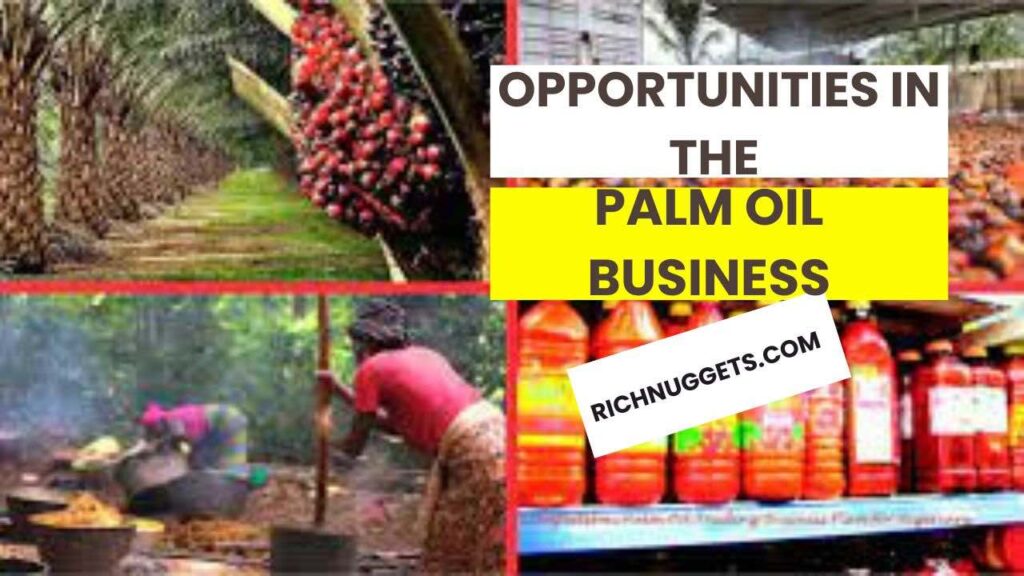
The palm oil Business also known as the red oil or vegetable oil business is an agricultural sector business that involves the production or/and distribution of palm oil products to consumers for consumption or to companies as byproducts.
If you are interested in a profitable agricultural business in Nigeria, the palm oil business in Nigeria is worth considering.
Palm oil holds significant importance in our food culture, making it a vital ingredient. In fact, Nigeria recorded the highest palm oil consumption (1,790 metric tons) in 2022/2023, as reported by Statista.
Moreover, palm oil offers diverse applications beyond food. It is utilized in the production of detergents, biofuel, animal feed, lubricants, paints, inks, coatings, candles, cosmetics, personal care products, soaps, shampoo and conditioner formulations, lotions, and moisturizers, among others.
Even if a prominent figure were to criticize the use of palm oil in food, causing 90% of the global population to cease its inclusion in food processing, the palm oil business would still thrive. This is because numerous industries rely on palm oil in various ways.
Considering this, let’s delve into the intricacies of starting a palm oil business in Nigeria and the factors that may influence your decision positively.
Table of Contents
Is Oil Palm Profitable in Nigeria?

Yes, the Oil palm business in Nigeria is a profitable agricultural business in Nigeria. The profitability of the oil palm business in Nigeria is attributed to the high demand for palm oil both domestically and industrially.
However, the oil palm industry has suffered some setbacks in the past due to negligence from the government who decided to prioritize crude oil production to the detriment of other sectors in the country.
As a result of this negligence, Nigeria, the world’s number one (1) oil producer in the 1960s, is now barely the 5th in the world of palm oil production, spending over N300bn in import of palm oil.
But in order to mitigate the situation, and to encourage farmers, the CBN came up with an “Anchor Borrower Programme”.
The programme has been designed to create economic linkages between small holder farmers and processors by organizing farmers into cooperatives to boost production and take advantages of economics of scale.
CBN
In other to make this anchor borrower program effective many financial agencies were included in the facilitation.
Opportunities in The Palm Oil Business

The palm oil industry offers several opportunities for individuals interested in entering the business such as;
1. Plantation Ownership:
Engaging in plantation ownership within the palm oil industry entails the ownership and management of an expansive land area dedicated to cultivating palm trees for their fruits. This presents a lucrative opportunity due to the rising demand for palm oil.
By owning a plantation, you can secure a consistent supply of palm fruits, which serve as the raw material for producing palm oil.
This is significant considering palm oil’s wide usage in various products such as food, cosmetics, and biofuels. Hence, investing in a plantation allows you to capitalize on the increasing demand for palm oil while establishing a dependable source of income.
2. Palm Oil Processing:
Palm oil processing involves the conversion of palm fruits into usable palm oil through extraction and refining processes to ensure its purity and quality.
This presents a lucrative business opportunity as there is a constant demand for palm oil in various sectors such as food, cosmetics, and biofuels.
By establishing a palm oil processing plant, you can meet this demand and generate profit. It is a favorable venture due to the versatile applications of palm oil and its consistent market demand, making it a promising opportunity to capitalize on.
3. Palm Oil Trading:
Palm oil trading involves acting as an intermediary ie a middleman between palm oil producers and potential buyers.
This business is not only highly profitable but also less capital intensive as you procure palm oil from producers, such as plantation owners, and then sell it to companies utilizing palm oil in their products or to distributors supplying retail stores.
To excel in this venture, it is crucial to possess in-depth market knowledge, including understanding palm oil prices and trends. Additionally, adept management of logistics, encompassing the transportation of palm oil from producers to buyers, is essential.
Upholding the quality of the palm oil is vital for maintaining strong customer relationships. By effectively carrying out these tasks, you can generate revenue by connecting palm oil producers with buyers in need of this valuable commodity.
To know more on palm oil trading read this article; Key Steps to Becoming a Successful Palm Oil Supplier in Nigeria
4. Palm Oil Distribution:
Palm oil distribution involves establishing a robust system to transport and deliver palm oil to various destinations, including stores, companies, and food manufacturers.
This presents a profitable opportunity due to the widespread demand for palm oil across numerous industries.
To thrive in this business, efficient organization of palm oil transportation is essential, ensuring the safe and timely delivery of the product to its intended locations.
Cultivating strong relationships with both palm oil producers and prospective buyers is also crucial. By accomplishing these tasks, you can establish a reliable network for palm oil distribution, thereby generating revenue from this venture.
5. Value-added Products:
Value-added products refer to special goods that utilize palm oil as a primary ingredient. The versatility of palm oil allows for the creation of various practical items such as margarine, cooking oil, soap, cosmetics, and biodiesel.
Initiating a business that specializes in manufacturing these products presents a lucrative opportunity to generate income.
The high demand for these sought-after items ensures a favorable market for those who can supply them, making it an excellent prospect to meet consumer needs and achieve financial success.
6. Research and Development:
Engaging in research and development within the palm oil industry entails investing in the exploration of novel and enhanced methodologies.
An excellent illustration of such commitment is the Nigerian Institute for Oil Palm Research (NIFOR), globally renowned for its substantial contributions to the advancement of the palm oil industry in Nigeria through its groundbreaking research on seedlings.
Through research and development endeavors, innovative concepts can be devised to enhance palm oil production.
For instance, you can explore techniques to maximize fruit yield from palm trees, thereby increasing palm oil output. Additionally, there is potential to develop new products utilizing palm oil or discover alternative applications for byproducts generated during the palm oil production process.
Investing in research and development facilitates the growth and sustainability of the palm oil industry. It enables the discovery of improved methodologies, benefiting both the environment and the industry’s overall strength.
It’s important to note that the palm oil industry has faced criticism for its environmental impact, including deforestation and habitat destruction. Therefore, incorporating sustainable practices and responsible sourcing methods can help mitigate these concerns and create a more environmentally and socially responsible business.
Before pursuing any opportunity in the palm oil industry, thorough market research, understanding of regulations, and consideration of sustainability aspects are crucial for long-term success.
Steps on How to Start Palm Oil Business in Nigeria

Step 1. Decide on the Palm Oil Business Opportunity to Start
As earlier said there are several business opportunities that the Palm Oil business offers to aspiring entrepreneurs.
You can choose to kick off your entrepreneurial journey in the palm oil business with one of the opportunities because it is less capital-intensive and later on expand to include other opportunities at your discretion.
However, it is important to note that your available capital and knowledge will influence your choice of investment within the palm oil industry’s business opportunities.
Below are the opportunities offered by the palm oil business;
- Plantation Ownership
- Palm Oil Processing
- Palm Oil Trading
- Palm Oil Distribution
- Value-added Products
- Research and Development
Step 2. Business Plan
As usual, a business plan is a written document that outlines the goals, strategies, and financial projections for a business. It serves as a roadmap or guide for the business owner, providing clear direction and a framework for making informed decisions.
The importance of a business plan extends beyond complex opportunities like the palm oil business. It is equally necessary for less complex opportunities.
A well-crafted business plan helps the business owner understand the financial requirements and anticipate the potential profitability of the venture.
No matter how or who helps you out in creating your business plan, as long as it is in the palm oil industry, the below items must be present in the document;
- Goals:
- Target market
- Marketing strategies
- Operational processes
- Financial projections
- Risk management strategies
Moreover, a comprehensive business plan plays a pivotal role in attracting potential investors to support your palm oil business venture.
Furthermore, it is essential to regularly review and update your business plan in this ever-evolving industry. This ensures that you are not operating your business based on outdated statistics and projections, but rather keeping pace with the latest trends and developments.
Step 3. Capital
With the help of the perfect business plan, you must have been able to know the cost associated with the specific type of palm oil business opportunity you intend to pursue.
For the less capital-intensive palm oil opportunities such as palm oil trading, value-added products, and palm oil distribution, you can start with 200,000 to 300,000. This excludes the possibility of purchasing a personal vehicle, meaning you will be renting a vehicle to help with transportation.
While for capital-intensive palm oil opportunities such as plantation ownership, palm oil processing, research and development, you will need a minimum of N10 million Naira to get started.
If you have issue meeting with the required capital, you can seek other options of funding such as;
- Personal Finances
- Partners or Family Members
- Loans or Credit
To know how to take advantage of government Agricultural loans and grants, click here.
Step 4. Legal Requirement
To ensure the smooth operation of your palm oil business and avoid frequent legal issues, it is crucial to fulfill the necessary legal requirements associated with your chosen business opportunity. Each palm oil business opportunity may entail specific additional legal obligations, but one common factor among them all is the need to meet certain legal requirements.
Below is the list of legal requirements to be met before you can legally start a palm oil business in Nigeria;
- Business Name
- Business Registration with the Corporate Affairs Commission (CAC)
- Obtain Tax Identification Number (TIN)
- National Agency for Food and Drug Administration and Control (NAFDAC) registration (excluding; Palm Oil Distribution and Plantation Ownership)
- Land Clearance Permit (Plantation Ownership only)
- Environmental Impact Assessment (EIA) (Plantation Ownership, and Palm Oil Processing only)
For additional licenses especially with the Research and Development in the palm oil industry, please visit the office/website of the Federal Ministry of Agriculture and Rural Development.
Read Also; How to Start a Business in Nigeria to get more knowledge when it comes to starting a business in Nigeria.
Step 5. Location and Infrastructure
No matter your chosen business opportunity in the palm oil business, you need a physical location either for storage (if your customer target are online), as an office or both. Infracture is also needed for the the smooth operation of the business. Such infrastructure includes;
- Nursery Facilities to propagate and raise oil palm seedlings (Research and Development, and Plantation Ownership only)
- Palm Oil Processing Plant (Palm Oil Processing)
- Storage Facilities
- Transportation Infrastructure
- Utilities (electricity, water supply, and waste management systems etc)
- Packaging and Distribution Facilities
Step 6. Implement Marketing Strategies
Marketing is an essential aspect that holds equal importance to other steps in starting your palm oil business. Once you have identified your target market and commenced operations, it becomes crucial to create awareness and let people know about your palm oil business. Without effective marketing, you may encounter difficulties in generating sales, which is undesirable for the success of your business. Below are some of the best marketing strategy to use for your palm oil business.
- Develop a Brand Identity
- Online Marketing If you desire to sell online
- Participate in relevant trade fairs, agricultural exhibitions, or industry events where you can showcase your oil palm products.
- Establishing direct sales channels to reach customers
- Establish a distribution channel by partnering with local distributors or wholesalers who can help expand your reach and ensure wider distribution of your products.
- Highlight the quality and sustainability of your palm oil products
- Encourage customer engagement and feedback
Remember consistency, creativity, and a customer-centric approach are key to successfully promoting your oil palm products and establishing a strong market presence.
Step 7: Seek professional advice
Seeking professional advice is a crucial step when embarking on an oil palm business, as it enables you to leverage the expertise and experience of industry professionals.
While seeking professional guidance may come with a cost, the value it brings far outweighs the investment. It is advantageous to possess both practical insights and theoretical knowledge about the palm oil business before commencing rather than relying solely on theoretical knowledge and learning through trial and error.
Having professional guidance at the beginning of your journey offers the benefit of minimizing errors and pitfalls along the way, contributing to a smoother and more successful Business.
Other benefits of seeking a professional adviser are;
- Access to specialized knowledge
- Risk assessment and mitigation
- Market Intelligence
- Assist you with Regulatory compliance
- Business planning and financial analysis
- Access to extensive networking and partnerships:
Remember that while seeking professional advice is beneficial, it is essential to carefully select reputable and trustworthy experts and consultants. Look for individuals or firms with relevant experience, a proven track record, and positive recommendations. Engage in open and transparent communication to ensure that your goals and expectations align with their expertise and capabilities.
Challenges for Starting a Palm Oil Business in Nigeria
Here are some challenges and potential solutions for starting a palm oil business in Nigeria:
- Land Availability and Quality: Securing sufficient and suitable land for palm oil plantation.
Solution: Engage with local communities, leverage government agricultural programs, and consider sustainable land-use practices. Conduct soil tests to ensure the selected land is suitable for palm oil cultivation. - High Initial Investment: The high cost of establishing a palm oil plantation and processing facility.
Solution: Explore financing options, such as agricultural loans, grants, or partnerships with investors. Develop a comprehensive business plan to attract potential investors or financial institutions. - Long Gestation Period: Palm oil trees take several years to mature and start producing fruits.
Solution: Plan for the long term and diversify income streams. Consider intercropping with short-term crops to generate revenue while waiting for the palm trees to mature. - Market Price Volatility: Fluctuations in the market price of palm oil.
Solution: Implement risk management strategies, such as futures contracts or hedging, to mitigate the impact of price fluctuations. Explore value-added products like palm kernel oil or bioenergy to diversify income. - Pest and Disease Management: Palm oil plantations are susceptible to pests and diseases.
Solution: Implement integrated pest management practices, conduct regular inspections, and invest in disease-resistant palm varieties. Collaborate with agricultural extension services for guidance on effective pest and disease control measures. - Labor Intensity: Palm oil cultivation and processing can be labor-intensive.
Solution: Invest in training programs for local workers, explore the use of mechanization for certain tasks, and consider forming partnerships with agricultural cooperatives to share labor resources. - Environmental Sustainability: The palm oil industry has faced criticism for environmental issues, including deforestation.
Solution: Adopt sustainable and environmentally friendly practices, such as agroforestry and zero-deforestation policies. Comply with relevant environmental regulations and certifications to enhance the sustainability of the business. - Quality Standards and Certification: Meeting quality standards and obtaining certifications for palm oil products.
Solution: Invest in good agricultural practices, adhere to quality standards, and pursue certifications such as RSPO (Roundtable on Sustainable Palm Oil) to access premium markets. Compliance with international standards can enhance marketability. - Access to Processing Facilities: Limited access to efficient and modern processing facilities.
Solution: Collaborate with existing processing facilities or invest in your own. Explore government initiatives or private sector partnerships to improve processing infrastructure in the region. - Government Policies and Regulations: Navigating complex government regulations and policies.
Solution: Stay informed about regulatory changes, engage with industry associations, and participate in advocacy efforts. Seek legal advice to ensure compliance with local and international regulations.
READ ALSO:
- Key Steps to Becoming a Successful Palm Oil Supplier in Nigeria
- Rice Business in Nigeria Made Easy: A Success Guide
- The Beginner’s Guide to Starting a Profitable Poultry Farming Business in Nigeria
- How to Start a Successful Goat Farming Business in Nigeria
- Start a Pig Farming Business in Nigeria: Make 500k to a million monthly
Final Thoughts on starting a Palm oil business in Nigeria
That concludes our discussion on the palm oil business in Nigeria. One important point to note about this industry is its profitability, regardless of the specific type of palm oil business opportunity you choose to pursue or invest in.
Just so you know; Palm oil is commonly known by different names depending on the context or regional variations. Some of the other names used for palm oil include:
- Palm Fruit Oil
- Red Palm Oil
- African Palm Oil
- Dende Oil (in Brazil)
- Elaeis Guineensis Oil (scientific name)
- Vegetable Oil (in some general contexts)
- Tropical Oil (in relation to its origin)
These are alternative names used to refer to palm oil, but it’s important to note that they all refer to the same oil derived from the palm fruit of the Elaeis guineensis tree.
Remember to turn on the Bell 🔔 Notification Icon to get updated on your device when new articles are published.
Discover more from StartBizEasy
Subscribe to get the latest posts to your email.





